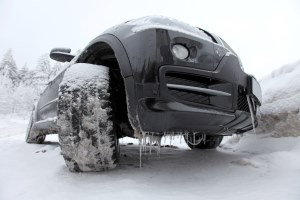Winter is upon us and soon our drive to work in the morning will be snow covered and icy; should you trade your all-season tires in for a set of winter tires?

In some areas of the United States snow has already made its arrival and in others it's on its way, so that can only mean one thing – it is time to get snow tires – or maybe not? It's hard to say whether or not winter tires would be best for your situation because it depends on many factors. For example, if you live in an area that gets very cold and multiple inches of snow are on the ground at any given time, you would benefit from buying a full-set of snow tires. On the other hand, if you live in the South where winters are fairly mild and it only snows once in a blue moon, your all-season tires will probably do the trick.
We would love to be able to give you a 'yes' or 'no' answer to your question, but truth is – it's not that simple. Luckily, to help make your decision process a little easier Auto Credit Express has put together a list of our best questions and answers that we are often on this subject.
How Are All-Season Tires Different from Snow Tires?
All-season tires are tires that stay on your car all-year around (hence the name). They are made to take on roads of pretty much any condition like:
- Dry
- Wet
- Gravel
- Dirt
- Light snow
These tires, however, are not made for extremely cold weather or heavy snow. The rubber they are made with can harden in harsh temperatures, making it harder for them to grip the road and give you the traction you need to stay on course.
Snow tires are made specifically for exceptionally cold temperatures and harsh snow conditions. The rubber these tires are made with is able to stay flexible which allows you to get a better grip on the snow, ice, or slush, improving your ability to stay on the road and arrive at your destination safely.
Do I Need to Purchase a Full-Set of Snow Tires?
With the holidays a mere seven weeks away, we are all trying our best to save as much money as possible, so we may opt to only buy two winter tires. If your car is front-wheel drive, you'll put them on the front. If it's rear-wheel drive, you'll put them on the back, and if it's all-wheel drive you get to choose where you want them, right? Wrong! Although it would be cheaper to buy two winter tires initially, it could cost you more in the end.
When you have two different sets of tires on your vehicle, you cause your car tires to work separately instead of together. This will cause many issues such as:
- The tires will wear differently and need to be replaced sooner
- You will have less control over the car in harsh winter weather
- The safety that you ensure to yourself and other drivers decreases because there is less control and handling over the vehicle.
Do yourself a favor, and buy all four tires at once. You will be thanking yourself in the spring time when all four of your all-season tires are good to be put back on your car, and you don't need to purchase two new ones.
4x4's and All-Wheel Drive Vehicles Still Need Snow Tires
So, you drive a full-size pick-up truck that has four-wheel drive, therefore, you don't need to put on winter tires, right? Unfortunately, wrong again! Even the biggest and baddest trucks and SUVs need to have the proper tires on them when the snow falls. AWD and 4WD vehicles send power to all four wheels when you accelerate, instead of the two that a FWD or RWD use.
Snow tires allow you to maximize grip on the road, have better traction when rounding corners, and have good control when coming to an abrupt stop or take-off as well. Having the correct tires is a part of your routine maintenance check on your car, you wouldn't want to only replace two brakes if they all went out would you? Think of your tires the same way. By replacing them with snow tires, it will ensure that both you and your car are safer this winter.
Can I Use Winter Tires All Year?
Well, yes you could, but it's not recommended. As we talked about above, the rubber that is used on winter tires is different from all-season tires, and is not great in warm weather. These tires are made specifically for cold temperatures and can wear very easily in the warmer months and on hot pavement. It would actually cost you more money to replace your winter and all-season tires every year than it would to just switch between the two sets each year.
As We See It
Tires are the shoes for your car so think of it this way; you could easily wear tennis shoes all year round in the snow or in the heat, but wouldn't you rather keep your feet warm in the winter with winter boots and get better traction so you don't fall? And sure, you could wear your boots in the summer time, but don't you think you'd get a little too hot? Not to mention, those wouldn't look so good with your shorts or swim suit!
Winter tires are a necessity for all drivers that live in an area that experience cold temperatures and could logically get snow at any point in time. Keep you and your family safe this winter with the correct tires. If you're afraid that your car won't hold up this winter, maybe it's time to start thinking about buying a new car, too. We can help you get the process of car shopping underway with our online car loan application and our extended network of dealerships in the United States and Canada. Don't worry about what your credit report or scores show, because with Auto Credit Express – they don't matter! Our dealers can help anyone, with any credit score!



















